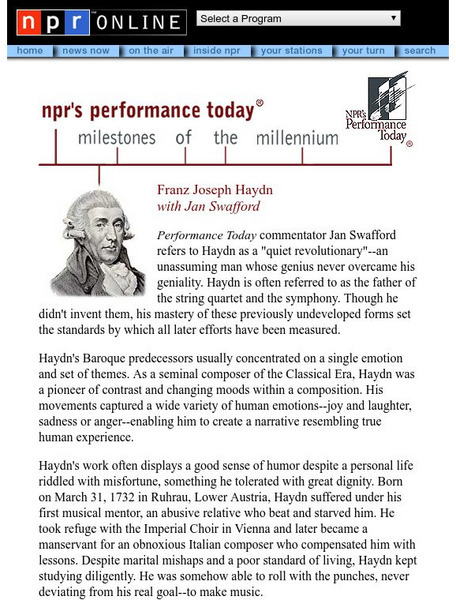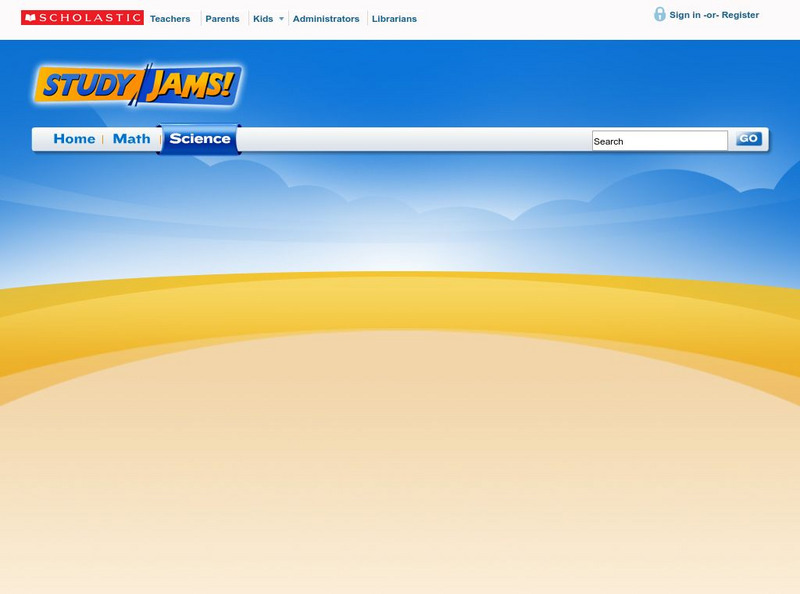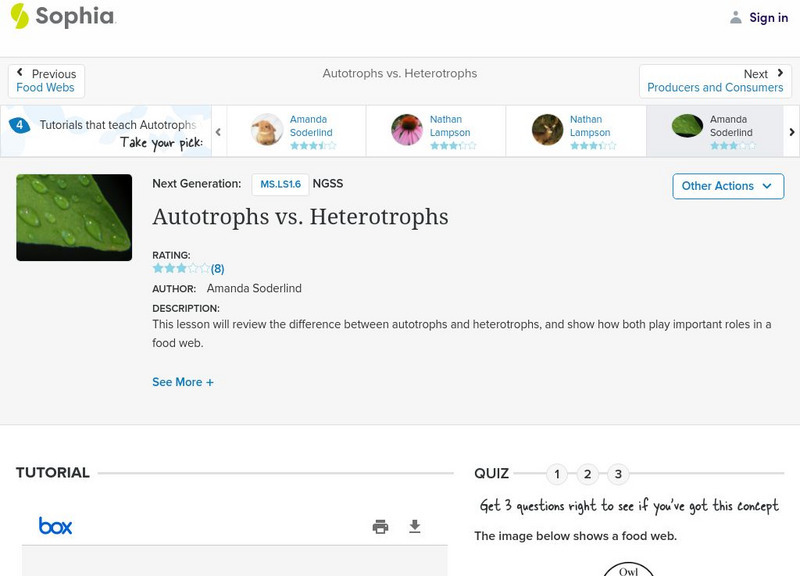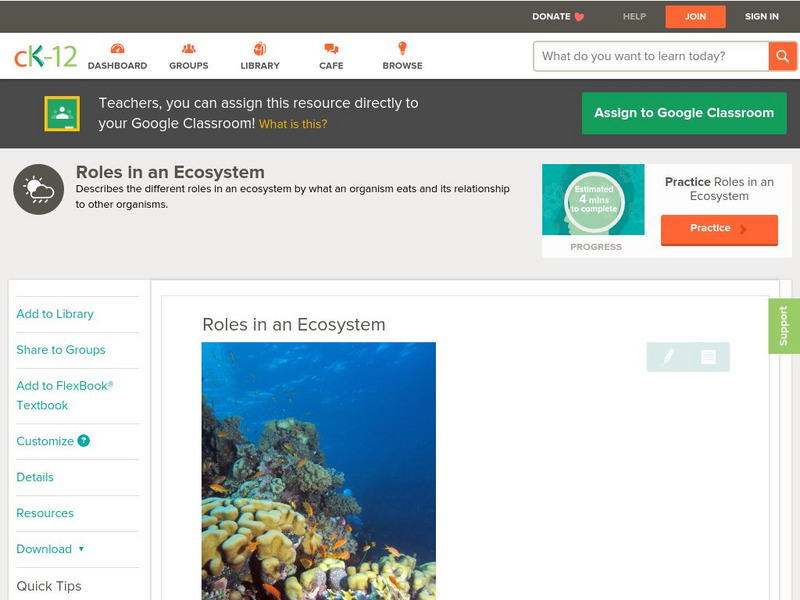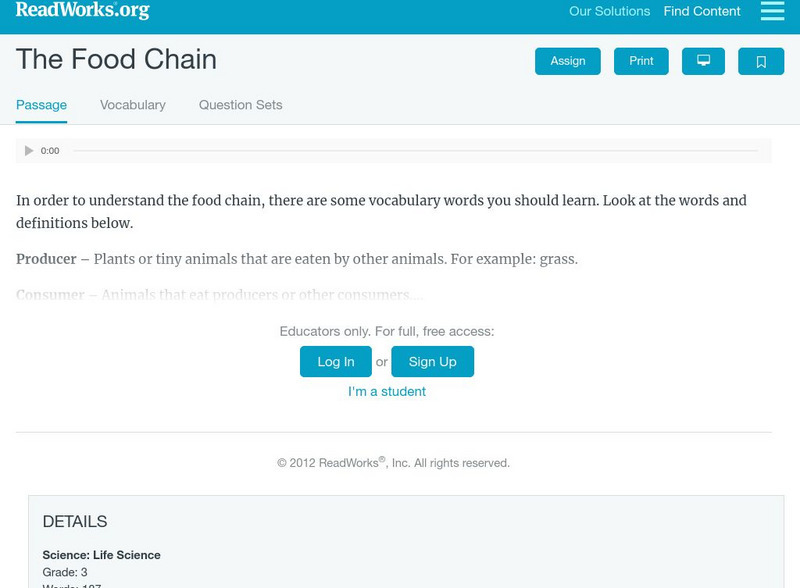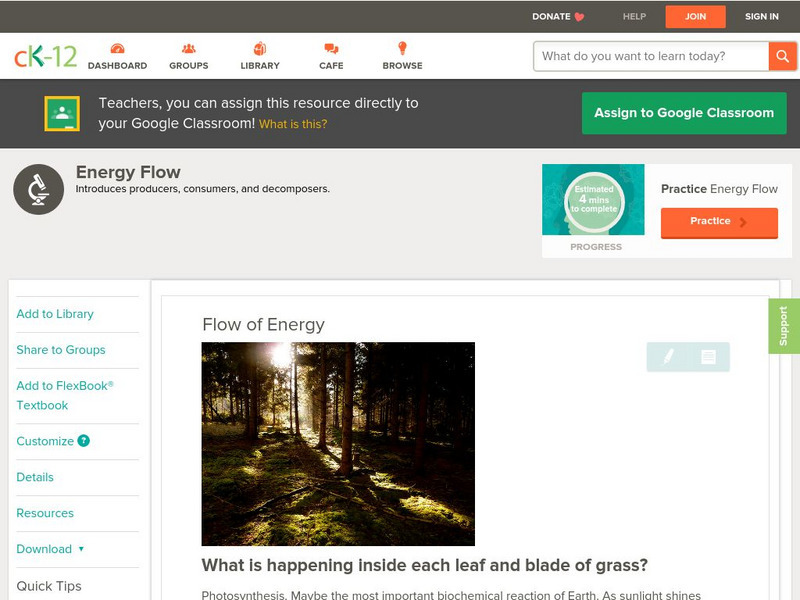Texas Education Agency
Texas Gateway: Organism Relationships: Food Chains, Webs, Pyramids
Given illustrations, students will analyze the flow of matter and energy in food chains, food webs, and ecological pyramids.
Annenberg Foundation
Annenberg Learner: Cinema: How Are Hollywood Films Made?
Site takes you through the steps in making a film. The site also invites you to "Write your own dialogue for a scene or put yourself in a producer's shoes by managing the production of a film."
Other
Media Line: Interactive Resource for Television Industry
This is a multimedia information center for journalists working (or hoping to work) in television. Great visuals and reader-friendly copy.
E-learning for Kids
E Learning for Kids: Science: South Africa: How Do Organisms Get Their Energy?
Join Ellen on her trip to the Kaap De Goede Hoop in South Africa, and learn more about plants, animals, and energy.
Science Education Resource Center at Carleton College
Serc: Habitat Part 2
This activity is designed for students to examine soil and determine which soil will be the best for plant growth. The students will also investigate the effect of sunlight on plants and the importance of sunlight in producing chlorophyll.
Science Education Resource Center at Carleton College
Serc: Food Chains: Nature's Restaurant
Students begin this lesson by making observations and recording evidence of the variety of living things in local nature site. Students use reference materials to research predators and food of the animals they observed, then illustrate...
Science Education Resource Center at Carleton College
Serc: Investigating Discovering What Plants Need for Photosynthesis
This activity will be used prior to any direct instruction for photosynthesis. In this inquiry lab, middle schoolers design and conduct simple experiments using elodea and Bromthymol blue to determine whether plants consume or release...
Science Education Resource Center at Carleton College
Serc: Investigating Ecosystems:determining Feeding Relationships Among Organisms
In this lab, students will complete a field study about feeding relationships between organisms and present their findings in a food web as well as in a written narrative.
CNN
Cnn: You Be the Producer
This is a great learning tool for producing and writing for television news. You have the opportuntity to judge stories and see if they would make it to the newscast.
FT Exploring
Ft Exploring: The Flow of Energy Through Plants and Animals
Explore the different ecological roles of organisms in the ecosystem, and find out how the energy flows through them.
NPR: National Public Radio
Npr: Franz Joseph Haydn
This is a biography on Franz Joseph Haydn. It also includes an audio lecture on Haydn with his music as a background to the lecture.
Other
Zephyrus: Food Puzzle Chain
Answer these ten interactive questions about ecological feeding relationships by choosing the correct image that completes each food chain.
IMDb
Im Db: David Mamet
This resource provides an extensive filmography of Mamet. Mamet's credits are categorized into writer, director, producer, and actor, and each film credit serves as a link to more information.
Scholastic
Scholastic: Study Jams! Science: Ecosystems
A video and a short multiple-choice quiz on the topic of ecosystems, covering biotic and abiotic factors, and the roles organisms play in an ecosystem.
Scholastic
Scholastic: Study Jams! Science: Ecosystems: Food Webs
A video and a short multiple-choice quiz on food webs that explains the difference between food webs and food chains, and the relationships that exist between organisms.
Sophia Learning
Sophia: Food Webs: Lesson 1
This lesson will explain how to create a food web to show transfer of energy within a community. It is 1 of 4 in the series titled "Food Webs."
Sophia Learning
Sophia: Autotrophs vs. Heterotrophs: Lesson 2
This lesson will review the difference between autotrophs and heterotrophs, and show how both play important roles in a food web. It is 2 of 4 in the series titled "Autotrophs vs. Heterotrophs."
CK-12 Foundation
Ck 12: Earth Science: Roles in an Ecosystem
[Free Registration/Login may be required to access all resource tools.] Describes the different roles in an ecosystem.
Utah Education Network
Uen: Biological Energy Food Chain Practice
After reviewing the roles of consumers, producers and decomposers, you'll create your own food chains using pictures from magazines. The site also has 18 questions to see if you can identify the ecologic role played by various organisms.
Utah Education Network
Uen: Everyone Works
Lesson that helps students understand the economic concepts of goods and services. Students categorize economic activities as goods or services, and discuss the goods and services exchanged in If You Give a Mouse a Cookie by Laura Jaffe...
Utah Education Network
Uen: Producing and Consuming
Lesson that helps students understand the difference between producers and consumers. Students create booklets, making them producers, and then use the booklets to complete the lesson, making them consumers.
South Carolina Educational Television
Kids Work! Real People: Producer
Interview [1:43] with a television producer in which she answers questions about her work, qualifications, and other career-related issues.
Read Works
Read Works: The Food Chain
[Free Registration/Login Required] An informational text explaining important vocabulary involving the food chain. A question sheet is available to help students build skills in reading comprehension.
CK-12 Foundation
Ck 12: Biology: Flow of Energy
[Free Registration/Login may be required to access all resource tools.] Describes how energy flows through an ecosystem.












